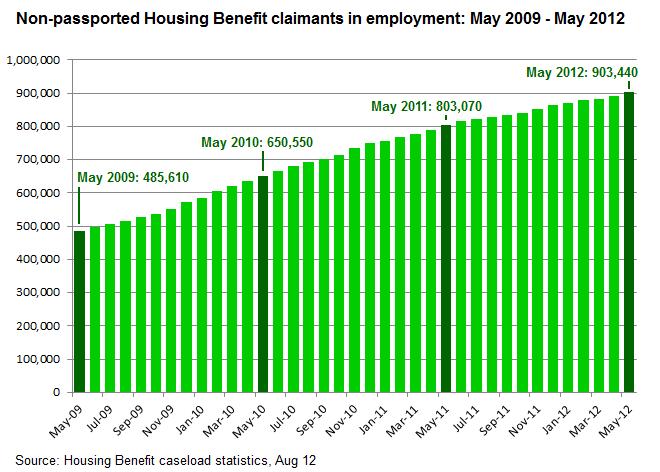How many working people are being forced onto Housing Benefit?
"Our report 'Home Truths 2012' found that in the last three years, 420,000 more working people have had to seek the support of housing benefit to pay their ever increasing rent - an astonishing 86% increase in the last three years alone. These numbers are rising by around 10,000 households every single month."
David Orr, Chief Executive, National Housing Federation, 22 October 2012
A report released today by the National Housing Federation (NHF) made headlines as it aimed to highlight stark truths about the "unholy mess" of the UK's housing market.
The NHF's Chief Executive was clear that the UK needed to build more homes if it is to tackle the 'affordability crisis' that has supposedly seen nearly 420,000 more working people forced onto housing benefit to make ends meet.
Join 72,953 people who trust us to check the facts
Sign up to get weekly updates on politics, immigration, health and more.
Subscribe to weekly email newsletters from Full Fact for updates on politics, immigration, health and more. Our fact checks are free to read but not to produce, so you will also get occasional emails about fundraising and other ways you can help. You can unsubscribe at any time. For more information about how we use your data see our Privacy Policy.
Regular Full Fact readers may be surprised to see such a claim after we found in June that the Department for Work and Pensions (DWP) doesn't actually measure the employment status of all Housing Benefit Claimants.
Nothing has actually changed since then. The Department confirmed only last week in response to a request for the figures that:
"The number of claimants of housing benefit (HB) who are unemployed is not available."
However this isn't to say that we don't know anything about the economic status of the five million Housing Benefit claimants in the UK. The DWP's statistics break down claimants into two categories: 'passported' (who are automatically entitled to Housing Benefit by virtue of already claiming other benefits) and 'non-passported'.
At the moment, if a person receives Income Support, Income-Based Jobseekers Allowance (JSA), Income-Based Employment and Support Allowance (ESA) or Guaranteed Pension Credit they are automatically entitled to Housing Benefit. They may be in part-time employment, subject to the benefits' eligibility restrictions.
3.28 million recipients of Housing Benefit fall into one of these categories, but we've no way of knowing how many will be in part-time employment due to limitations in the data.
Data for the 1.75 million 'non-passported' claimants is available however, as these are recorded by local authorities. As of August 2011 903,440 of these were in employment.
As the NHF correctly states, this is 417,830 more than were claiming in May 2009, and the figure has been rising by around 10,000 per month since 2011.

It's important to understand that the data for 'recipients' refers to benefit units rather than individuals. In other words, some recipients will be couples rather than individuals. The figures confirm that just over one million Housing Beneift claimants are couples (around one in five), so there could actually be significantly more than 418,000 more "working people" on the benefit since 2009.
'In employment' Housing Benefit claimants currently account for around 18% of the total Housing Benefit caseload, whereas back in 2009 they made up 11% of the total. So on this measure we can certainly derive an upwards trend both in the proportion and number of claimants who are definitely in work.
Given that this excludes passported claimants of Housing Benefit who may be in some sort of work these figures are likely, if anything, to be an underestimate of the true number of claimants who are doing some sort of work.